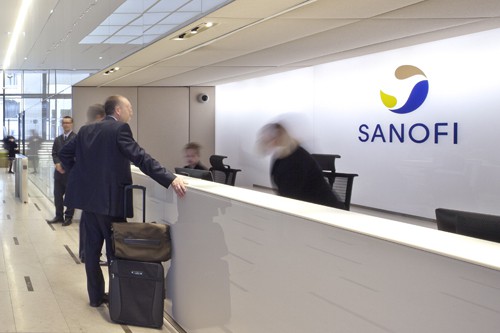
Sanofi and Regeneron have said they intend to move swiftly ahead with a rolling submission for their PD-1 inhibitor cemiplimumab on the back of phase II results in a form of skin cancer.
Cemiplimab was one of the drugs highlighted in Sanofi’s R&D day yesterday – although the company focused on its potential as a first-line non-small cell lung cancer (NSCLC) treatment – and is one of nine drugs expected to be filed by the pharma company in the next 18 months.
The data in cutaneous squamous cell carcinoma (CSCC), the second most common form of skin cancer, comes from a single-arm, open-label trial involving 82 patients and showed an overall response rate with the PD-1 inhibitor of 46% after at least six months’ follow-up.
With five drugs targeting PD-1 or PD-L1 already on the market Sanofi and Regeneron are set to be very late entrants into the category, and have chosen an indication which as yet has no other competitors and no approved therapies. CSCC is the second deadliest skin cancer after melanoma, and while quite treatable if caught early it is very serious in the advanced stages. Cemiplimumab was awarded a breakthrough designation by the FDA in September.
Data from the trial will form the basis of a rolling biologics license application (BLA) submission to the FDA, which is expected to be completed in the first quarter of 2018, in the same timeframe as a filing to the EMA.
“Advanced CSCC is responsible for 3,900 to 8,800 deaths per year in the US,” said Regeneron’s clinical development head Israel Lowy. “This is the largest prospective study ever conducted in this disease, and we are pleased that many people were able to achieve deep and durable responses with cemiplimab monotherapy.”
Sanofi’s R&D head Elias Zerhouni said that cemiplimab was being developed in both as monotherapy and combination across a number of solid tumour and blood cancers as the company sets off in pursuit of a share of the checkpoint inhibitor market, currently dominated by Bristol-Myers Squibb’s Opdivo (nivolumab) and Merck & Co’s Keytruda (pembrolizumab).
Roche’s Tecentriq (atezolizumab) is gaining ground quickly, while AstraZeneca’s Imfinzi (durvalumab) and Merck KGaA/Pfizer’s Bavencio (avelumab) have also been approved in their first indications and are starting to roll out but with slow progress. And with a bewildering array of checkpoint inhibitor trials already underway, the big question is whether there is scope for a sixth entrant to carve out anything but a niche position in the market.
The company plans to have pivotal trials ongoing in first-line NSCLC, second-line cervical cancer and advanced basal cell carcinoma – another form of skin cancer – in 2018, along with mid-stage trials as a combination therapy with Sanofi’s anti-CD38 drug isatuximab in multiple myeloma and solid tumours.
While cervical cancer and BCC are still an untapped marketed for immuno-oncology drugs, NSCLC – while a much larger market – is a trickier proposition, with Keytruda and other PD-1/PD-L1 inhibitors gaining momentum.
Sanofi said at its R&D yesterday that it believes there are still opportunities for a new entrant, and its phase III programme will comprise three studies – EMPOWER 1, 2 and 3 – that will examine the drug as a monotherapy and in combinations and will go head-to-head with chemotherapy and Keytruda.




